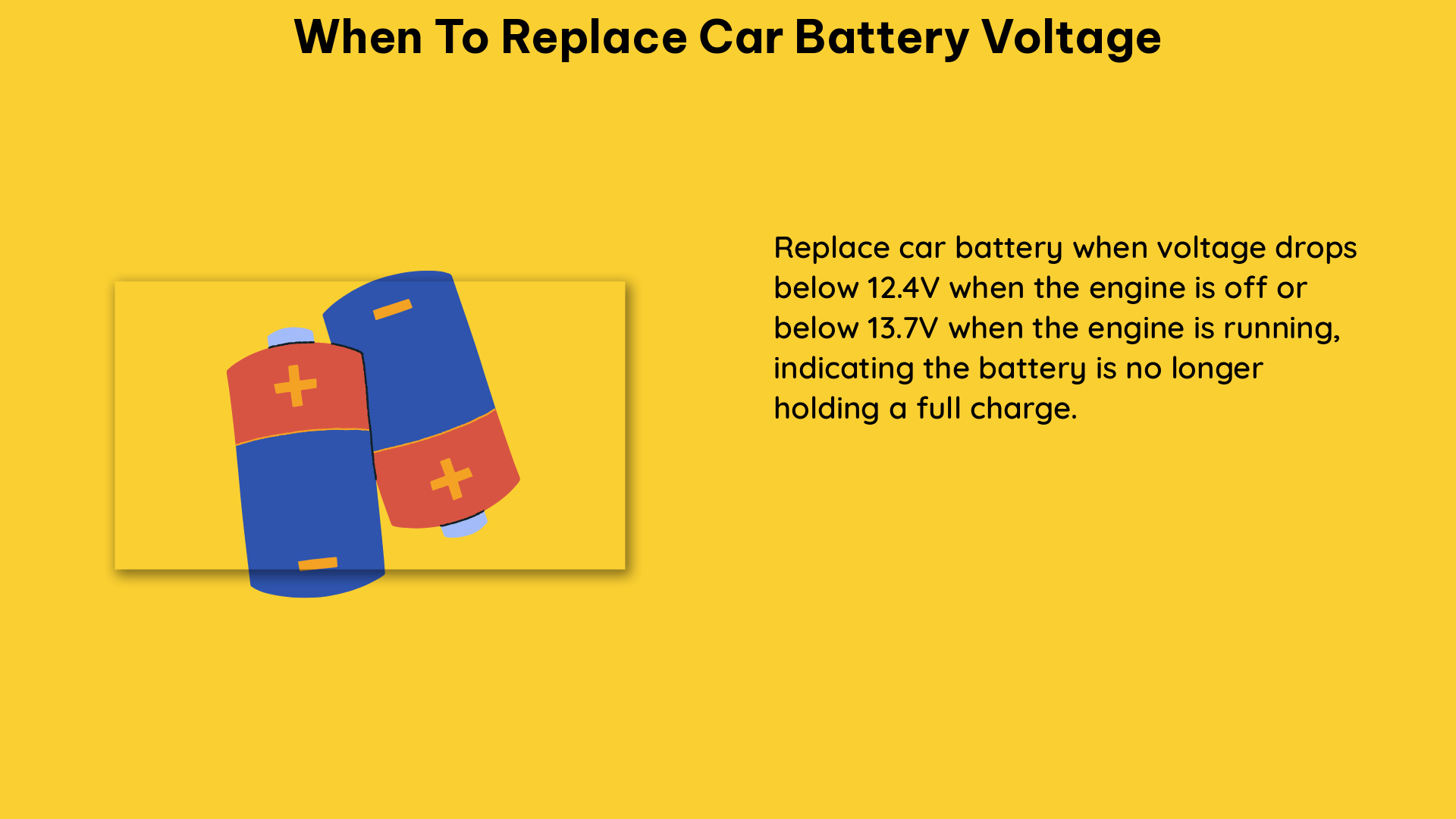When it comes to maintaining the health of your car’s battery, understanding the optimal voltage range and when to replace it is crucial. This comprehensive guide will provide you with the technical details and specific data points to help you determine the right time to replace your car battery based on voltage.
Resting Voltage: The Benchmark for a Healthy Battery
A good car battery should have a resting voltage between 12.4 to 12.6 volts. This resting voltage is measured when the car is turned off and the battery has had time to stabilize, typically after a few hours. This voltage range indicates that the battery is in good condition and can provide the necessary power to start your vehicle.
Voltage Drop During Driving: A Sign of Impending Failure

If the battery voltage drops significantly after driving the car for a while, it may be a sign that the battery is about to fail. A healthy battery should maintain its voltage within a narrow range, even under load. A voltage drop of more than 0.5 volts from the resting voltage could indicate that the battery is struggling to hold a charge and may need replacement.
Cranking Voltage: The Crucial Metric for Starting Power
When starting your car, the battery should provide a cranking voltage of at least 12.6 volts. If the cranking voltage drops below this threshold, it could mean that the battery is not able to deliver the necessary power to crank the engine and start the vehicle. This is a clear indication that the battery needs to be replaced.
State of Health (SoH): Estimating Battery Capacity
Battery diagnostics can be complex, and there is no single analytical device that can accurately assess the overall health of a battery. However, the State of Health (SoH) can be estimated based on various symptoms, such as capacity, internal resistance, and self-discharge. A new battery should deliver 100% of its rated capacity, and capacity is considered the leading health indicator of a battery.
Battery Capacity: The Key Indicator of Battery Health
To determine the battery’s capacity, you can perform a load test or a battery capacity test. These tests will provide a more accurate assessment of the battery’s condition than voltage alone. A battery that has lost a significant amount of its rated capacity (e.g., less than 80%) is a clear sign that it needs to be replaced.
Environmental Factors: Temperature and Driving Habits
In addition to voltage and capacity, environmental factors and driving habits can also affect the battery’s performance and lifespan. Extreme temperatures, both hot and cold, can accelerate the battery’s degradation. Similarly, frequent short trips and high-amperage usage (e.g., running the air conditioning or heating) can put additional strain on the battery, leading to premature failure.
Battery Replacement Recommendations
Based on the information provided, here are some general guidelines for when to replace your car battery:
- If the resting voltage is consistently below 12.4 volts, it’s time to replace the battery.
- If the cranking voltage during start-up drops below 12.6 volts, the battery should be replaced.
- If the battery capacity has dropped below 80% of its rated capacity, it’s recommended to replace the battery.
- If the battery is more than 3-4 years old and you notice significant voltage drops or starting issues, it’s a good idea to replace the battery as a preventative measure, especially before the winter season.
Remember, these are general guidelines, and the actual battery replacement timeline may vary depending on your specific vehicle, driving conditions, and battery usage patterns. It’s always best to consult your owner’s manual or a professional mechanic for personalized recommendations.
Conclusion
Maintaining the health of your car’s battery is crucial for reliable performance and avoiding unexpected breakdowns. By understanding the optimal voltage range, capacity, and environmental factors that affect battery life, you can make informed decisions on when to replace your car battery. This comprehensive guide provides the technical details and specific data points to help you stay on top of your battery’s condition and ensure your vehicle is always ready to hit the road.
References:
– Candlepower Forums – 12V Car Batteries: Resting Voltage & When to Replace
– Battery University – Fundamentals in Battery Testing
– Mechanics Stack Exchange – How do I know if my car battery needs replaced or just fully charged?
– Bob Is The Oil Guy – Battery Test Results – Replace?

The lambdageeks.com Core SME Team is a group of experienced subject matter experts from diverse scientific and technical fields including Physics, Chemistry, Technology,Electronics & Electrical Engineering, Automotive, Mechanical Engineering. Our team collaborates to create high-quality, well-researched articles on a wide range of science and technology topics for the lambdageeks.com website.
All Our Senior SME are having more than 7 Years of experience in the respective fields . They are either Working Industry Professionals or assocaited With different Universities. Refer Our Authors Page to get to know About our Core SMEs.